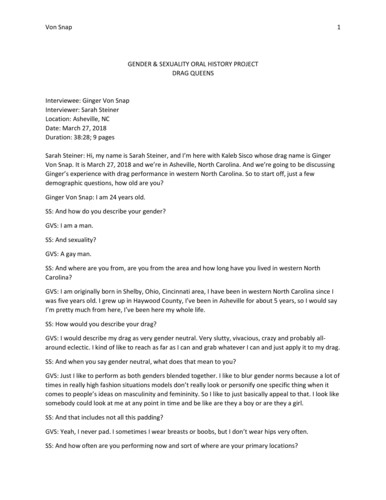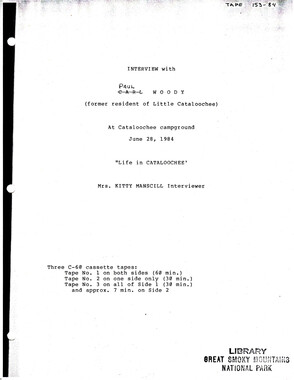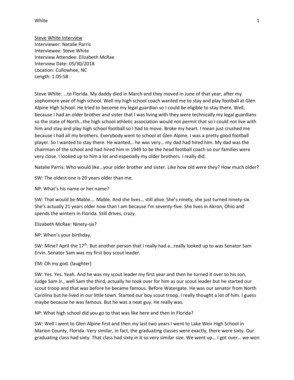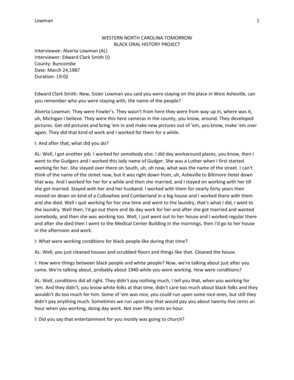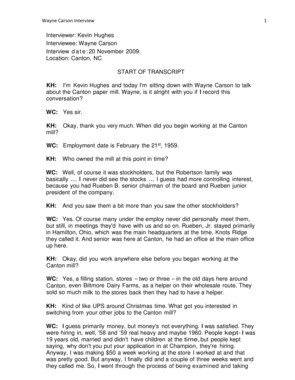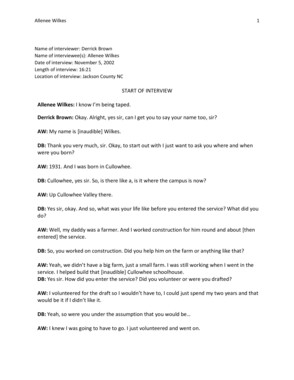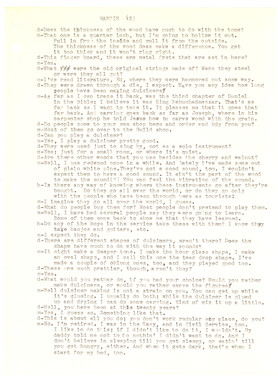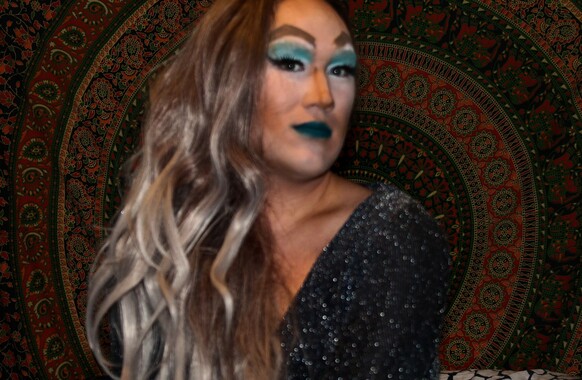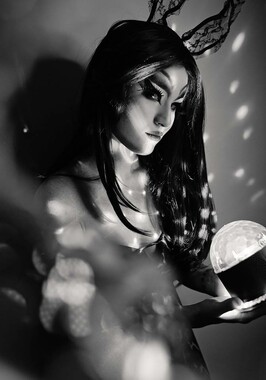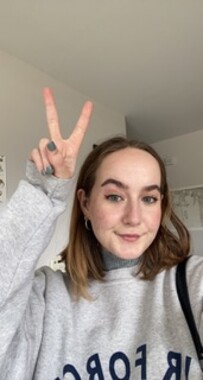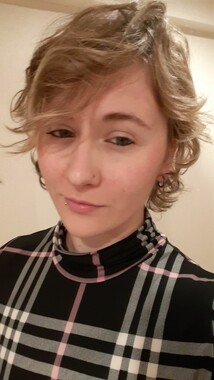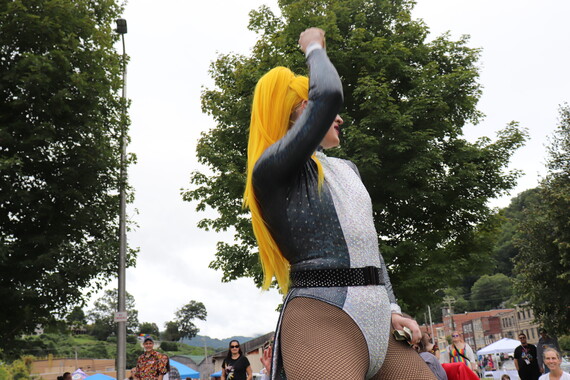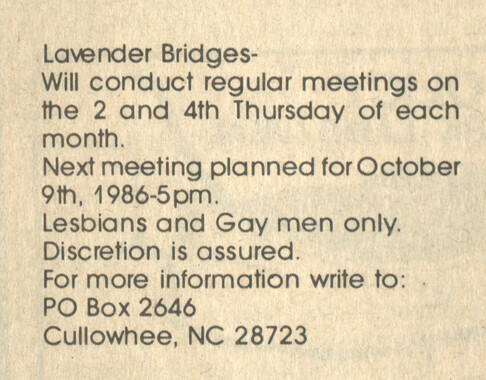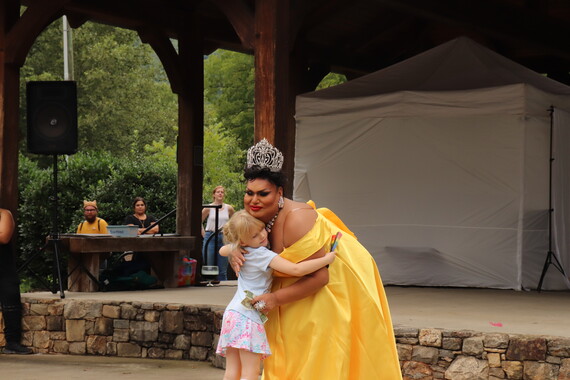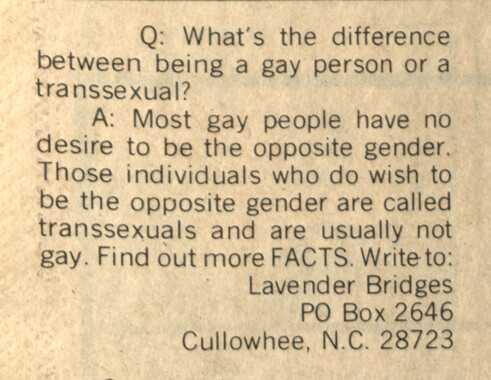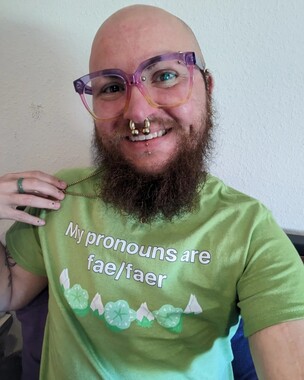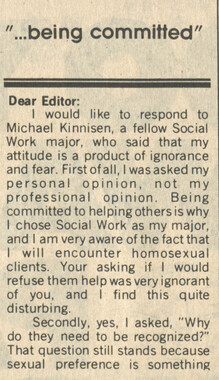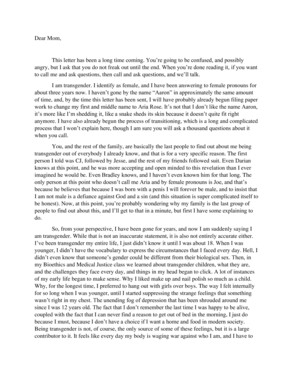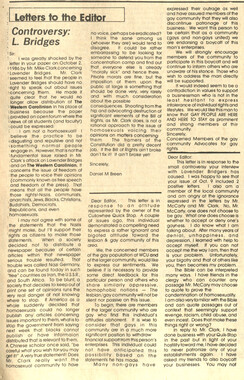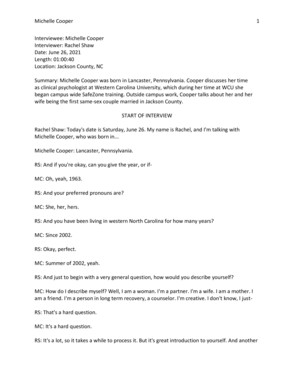Western Carolina University (20)
View all
- Canton Champion Fibre Company (2308)
- Cherokee Traditions (293)
- Civil War in Southern Appalachia (165)
- Craft Revival (1942)
- Great Smoky Mountains - A Park for America (2767)
- Highlights from Western Carolina University (430)
- Horace Kephart (941)
- Journeys Through Jackson (154)
- LGBTQIA+ Archive of Jackson County (19)
- Oral Histories of Western North Carolina (314)
- Picturing Appalachia (6679)
- Stories of Mountain Folk (413)
- Travel Western North Carolina (160)
- Western Carolina University Fine Art Museum Vitreograph Collection (129)
- Western Carolina University Herbarium (92)
- Western Carolina University: Making Memories (708)
- Western Carolina University Publications (2283)
- Western Carolina University Restricted Electronic Theses and Dissertations (146)
- Western North Carolina Regional Maps (71)
- World War II in Southern Appalachia (131)
University of North Carolina Asheville (6)
View all
- 1950s (1)
- 1960s (1)
- 1970s (2)
- 1980s (52)
- 1990s (10)
- 2000s (11)
- 2010s (19)
- 2020s (35)
- 1600s (0)
- 1700s (0)
- 1800s (0)
- 1810s (0)
- 1820s (0)
- 1830s (0)
- 1840s (0)
- 1850s (0)
- 1860s (0)
- 1870s (0)
- 1880s (0)
- 1890s (0)
- 1900s (0)
- 1910s (0)
- 1920s (0)
- 1930s (0)
- 1940s (0)
- Asheville (N.C.) (1)
- Buncombe County (N.C.) (4)
- Jackson County (N.C.) (91)
- Appalachian Region, Southern (0)
- Avery County (N.C.) (0)
- Blount County (Tenn.) (0)
- Cherokee County (N.C.) (0)
- Clay County (N.C.) (0)
- Graham County (N.C.) (0)
- Great Smoky Mountains National Park (N.C. and Tenn.) (0)
- Haywood County (N.C.) (0)
- Henderson County (N.C.) (0)
- Knox County (Tenn.) (0)
- Knoxville (Tenn.) (0)
- Lake Santeetlah (N.C.) (0)
- Macon County (N.C.) (0)
- Madison County (N.C.) (0)
- McDowell County (N.C.) (0)
- Mitchell County (N.C.) (0)
- Polk County (N.C.) (0)
- Qualla Boundary (0)
- Rutherford County (N.C.) (0)
- Swain County (N.C.) (0)
- Transylvania County (N.C.) (0)
- Watauga County (N.C.) (0)
- Waynesville (N.C.) (0)
- Yancey County (N.C.) (0)
- Clippings (information Artifacts) (47)
- Interviews (28)
- Photographs (27)
- Sound Recordings (25)
- Transcripts (28)
- Video Recordings (physical Artifacts) (5)
- Aerial Photographs (0)
- Aerial Views (0)
- Albums (books) (0)
- Articles (0)
- Artifacts (object Genre) (0)
- Biography (general Genre) (0)
- Cards (information Artifacts) (0)
- Crafts (art Genres) (0)
- Depictions (visual Works) (0)
- Design Drawings (0)
- Drawings (visual Works) (0)
- Envelopes (0)
- Facsimiles (reproductions) (0)
- Fiction (general Genre) (0)
- Financial Records (0)
- Fliers (printed Matter) (0)
- Glass Plate Negatives (0)
- Guidebooks (0)
- Internegatives (0)
- Land Surveys (0)
- Letters (correspondence) (0)
- Manuscripts (documents) (0)
- Maps (documents) (0)
- Memorandums (0)
- Minutes (administrative Records) (0)
- Negatives (photographs) (0)
- Newsletters (0)
- Newspapers (0)
- Occupation Currency (0)
- Paintings (visual Works) (0)
- Pen And Ink Drawings (0)
- Periodicals (0)
- Personal Narratives (0)
- Plans (maps) (0)
- Poetry (0)
- Portraits (0)
- Postcards (0)
- Programs (documents) (0)
- Publications (documents) (0)
- Questionnaires (0)
- Scrapbooks (0)
- Sheet Music (0)
- Slides (photographs) (0)
- Specimens (0)
- Speeches (documents) (0)
- Text Messages (0)
- Tintypes (photographs) (0)
- Vitreographs (0)
- WCU Gender and Sexuality Oral History Project (27)
- A.L. Ensley Collection (0)
- Appalachian Industrial School Records (0)
- Appalachian National Park Association Records (0)
- Axley-Meroney Collection (0)
- Bayard Wootten Photograph Collection (0)
- Bethel Rural Community Organization Collection (0)
- Blumer Collection (0)
- C.W. Slagle Collection (0)
- Canton Area Historical Museum (0)
- Carlos C. Campbell Collection (0)
- Cataloochee History Project (0)
- Cherokee Studies Collection (0)
- Daisy Dame Photograph Album (0)
- Daniel Boone VI Collection (0)
- Doris Ulmann Photograph Collection (0)
- Elizabeth H. Lasley Collection (0)
- Elizabeth Woolworth Szold Fleharty Collection (0)
- Frank Fry Collection (0)
- George Masa Collection (0)
- Gideon Laney Collection (0)
- Hazel Scarborough Collection (0)
- Hiram C. Wilburn Papers (0)
- Historic Photographs Collection (0)
- Horace Kephart Collection (0)
- Humbard Collection (0)
- Hunter and Weaver Families Collection (0)
- I. D. Blumenthal Collection (0)
- Isadora Williams Collection (0)
- Jesse Bryson Stalcup Collection (0)
- Jim Thompson Collection (0)
- John B. Battle Collection (0)
- John C. Campbell Folk School Records (0)
- John Parris Collection (0)
- Judaculla Rock project (0)
- Kelly Bennett Collection (0)
- Love Family Papers (0)
- Major Wiley Parris Civil War Letters (0)
- Map Collection (0)
- McFee-Misemer Civil War Letters (0)
- Mountain Heritage Center Collection (0)
- Norburn - Robertson - Thomson Families Collection (0)
- Pauline Hood Collection (0)
- Pre-Guild Collection (0)
- Qualla Arts and Crafts Mutual Collection (0)
- R.A. Romanes Collection (0)
- Rosser H. Taylor Collection (0)
- Samuel Robert Owens Collection (0)
- Sara Madison Collection (0)
- Sherrill Studio Photo Collection (0)
- Smoky Mountains Hiking Club Collection (0)
- Stories of Mountain Folk - Radio Programs (0)
- The Reporter, Western Carolina University (0)
- Venoy and Elizabeth Reed Collection (0)
- WCU Mountain Heritage Center Oral Histories (0)
- WCU Oral History Collection - Mountain People, Mountain Lives (0)
- WCU Students Newspapers Collection (0)
- Western North Carolina Tomorrow Black Oral History Project (0)
- William Williams Stringfield Collection (0)
- Zebulon Weaver Collection (0)
- College student newspapers and periodicals (46)
- Gender nonconformity (4)
- African Americans (0)
- Appalachian Trail (0)
- Artisans (0)
- Cherokee art (0)
- Cherokee artists -- North Carolina (0)
- Cherokee language (0)
- Cherokee pottery (0)
- Cherokee women (0)
- Church buildings (0)
- Civilian Conservation Corps (U.S.) (0)
- Dams (0)
- Dance (0)
- Education (0)
- Floods (0)
- Folk music (0)
- Forced removal, 1813-1903 (0)
- Forest conservation (0)
- Forests and forestry (0)
- Great Smoky Mountains National Park (N.C. and Tenn.) (0)
- Hunting (0)
- Landscape photography (0)
- Logging (0)
- Maps (0)
- Mines and mineral resources (0)
- North Carolina -- Maps (0)
- Paper industry (0)
- Postcards (0)
- Pottery (0)
- Railroad trains (0)
- Rural electrification -- North Carolina, Western (0)
- School integration -- Southern States (0)
- Segregation -- North Carolina, Western (0)
- Slavery (0)
- Sports (0)
- Storytelling (0)
- Waterfalls -- Great Smoky Mountains (N.C. and Tenn.) (0)
- Weaving -- Appalachian Region, Southern (0)
- Wood-carving -- Appalachian Region, Southern (0)
- World War, 1939-1945 (0)
Interview with Ginger Von Snap
Item
Item’s are ‘child’ level descriptions to ‘parent’ objects, (e.g. one page of a whole book).
-
-
Von Snap 1 GENDER & SEXUALITY ORAL HISTORY PROJECT DRAG QUEENS Interviewee: Ginger Von Snap Interviewer: Sarah Steiner Location: Asheville, NC Date: March 27, 2018 Duration: 38:28; 9 pages Sarah Steiner: Hi, my name is Sarah Steiner, and I’m here with Kaleb Sisco whose drag name is Ginger Von Snap. It is March 27, 2018 and we’re in Asheville, North Carolina. And we’re going to be discussing Ginger’s experience with drag performance in western North Carolina. So to start off, just a few demographic questions, how old are you? Ginger Von Snap: I am 24 years old. SS: And how do you describe your gender? GVS: I am a man. SS: And sexuality? GVS: A gay man. SS: And where are you from, are you from the area and how long have you lived in western North Carolina? GVS: I am originally born in Shelby, Ohio, Cincinnati area, I have been in western North Carolina since I was five years old. I grew up in Haywood County, I’ve been in Asheville for about 5 years, so I would say I’m pretty much from here, I’ve been here my whole life. SS: How would you describe your drag? GVS: I would describe my drag as very gender neutral. Very slutty, vivacious, crazy and probably all-around eclectic. I kind of like to reach as far as I can and grab whatever I can and just apply it to my drag. SS: And when you say gender neutral, what does that mean to you? GVS: Just I like to perform as both genders blended together. I like to blur gender norms because a lot of times in really high fashion situations models don’t really look or personify one specific thing when it comes to people’s ideas on masculinity and femininity. So I like to just basically appeal to that. I look like somebody could look at me at any point in time and be like are they a boy or are they a girl. SS: And that includes not all this padding? GVS: Yeah, I never pad. I sometimes I wear breasts or boobs, but I don’t wear hips very often. SS: And how often are you performing now and sort of where are your primary locations? Von Snap 2 GVS: I perform once or twice a week and I perform primarily at The Odditorium, Ole Shakey’s and anything for Blue Ridge Pride so that’s a lot of different things. SS: So, can you tell us about your history with drag, and I’m going to ask you a series of questions about it. So do you remember your first exposure to it or maybe your first time? GVS: Yes, actually my very first time seeing a drag show was whenever I lived in Florida I was going to hair school there. I had gone out with a friend of mine, it was her bridal shower so they asked me to get them all dressed up like drag queens and take them all to a drag show and we went to this really crazy pride event in Orlando, Florida. And it was definitely very interesting. I’d never seen so much creativity and so much fluorescentness in one room and I thought it was awesome. SS: Did you say how old you were? GVS: 24. SS: Oh I mean sorry, at the time of that? GVS: Oh, at that time? I was 20, 19. 19 or 20. SS: Did you have any other personal experiences prior to that that you feel comfortable sharing? GVS: Watching RuPaul’s drag race. My mom had a drag queen friend when I was 15 years old. He actually made my older sister’s prom dress from scratch which was kind of nice. I’d never seen him in drag, I’d never really experienced the culture so. SS: And did you have opportunities to talk to him about anything or have an interest in talking to him? GVS: Well, I think at that time I was very self-absorbed as most teenagers are so I wasn’t really concerned with that, but I did find it interesting that he was a drag entertainer. And I had talked to him a little bit about it, but nothing really in depth. SS: Alright. So what is drag to you, in terms of how would you define it? GVS: I think art falls under three major categories and that’s art, politics, and performance. And the reason I separate performance and art is because I feel like there is a lot of ways for you to display your creativity when it comes to construction and physical attributes of drag through art and then your performance is a whole different ball game. You can do different makeup looks and that’s the art, and then the performance is how you display it on the stage. SS: Do you see politics playing a role in what you do? GVS: Yes, a lot of time. Because with my involvement in Blue Ridge Pride and my involvement with a lot of trans rights activisms and things like that, I use it as an outreach to express how I feel and how I feel other people should understand trans people feel so I guess I use it a lot for that. SS: And who do you think – who in your mind can be participants as drag performers? GVS: I think anyone. My definition of drag is a larger than life personality putting on a larger than life show. SS: And how would you say your drag identity relates to your out of drag identity? Von Snap 3 GVS: They are completely different. Completely different. SS: In what ways? GVS: Well Ginger is very outspoken, she’s very comfortable. She is very easy to get along with, she’s very smooth, even sensual even. Really good at flirting. She’s just very confident. And then Kaleb lacks confidence. He’s an introvert. He doesn’t, he’s professional, he’s really good at carrying on professional situations. So, that’s why I always get upset when people judge me based on my drag persona because I know that when the wig and the makeup comes off I’m a completely different person. SS: And is that sort of a transition that happens sort of seamlessly for you? You don’t think about it, it just happens? GVS: I think it’s the whole process. A lot of people they are like, “How long does it take you to get ready?” and I say, “Oh just like an hour and a half.” But what they don’t realize is a lot goes on in that hour. Putting on your makeup is not just what happens. It’s a whole personality switch. SS: Really. Do you feel like it gives you an outlet for certain things and if so, GVS: What do you mean certain things? SS: I don’t know. So you’re talking about being more casually flirty and being more outgoing. Do you feel like…? GVS: Yes, I the funny thing is I never used to always be that way. Kaleb was the outspoken very opinionated, driven person, but there are a lot of experiences in life it’s kind of dulled my shine a little bit. So I feel like drag is a way of bringing out you know, that, what I used to be. So, I kind of see myself slowly using drag as a confidence booster. I think four years ago, looking back I probably wouldn’t be able to sit in a room and have an interview with somebody about something not being in drag. And then today it’s comfortable, it’s easy to talk about and then even flirting and relationships and things like that I find that using Ginger as an excuse to flirt and talk to people has made it easier for Kaleb to do so. SS: So how does drag in western North Carolina compare to drag in sort of other areas you might be familiar with. You mentioned Orlando and Atlanta I think. GVS: The southern states I think is appropriate to lump into one group and that’s pageant drag I think. All the southern states, from Florida all the way up to even Virginia, Kentucky, Tennessee, places like that. And then, it’s like an L, and then all the way over to Texas, that whole sweep I feel like is just very pageant-driven. They just glitz and glamor and big wigs and crazy makeup and then other places in the world, like Chicago, New York, Washington, D. C., Los Angeles, it’s very fashion driven, very unique. And then just about anywhere else I feel like it’s, breaks down what is specific in that area. Like New York is very high fashion so I feel like the drag is very high fashion. North Carolina, Tennessee, South Carolina, is very country and small-minded so I feel like the drag is very similar too. SS: [laugh] Is that true in Asheville specifically? GVS: I think it’s changing, but I think it once was, yes. Von Snap 4 SS: I’m going to ask this question, if you don’t want to answer it totally understand. So what feels small minded about it, what does that really look like? Exclusion of certain groups, or certain people, or styles of drag? GVS: I just know that whenever I first started performing, no one accepted me. I was alone, 100% alone with my drag. I had a coach who I wanted to be my “drag mother” but their drag family refused to accept me because they didn’t like my style of drag, they didn’t think I would make it. I was told by a lot of individuals in this town, in this area that I was too different, that I wasn’t going to make it, that I wasn’t enough, that I didn’t appeal to the masses appropriately I guess if you will. And then I started getting bookings, I’m one of the only girls in Asheville, North Carolina to date that still works out of North Carolina, performs in other places regularly. I’m one of the only girls that does songs by males. I’m one of the only girls that does performances that are gender fluid. So I feel that’s the biggest thing about small-mindedness is a lot of media is focusing really hard on drag right now. All over the world there are TV shows that display it. Movies, there’s even magazine covers and fashion spreads with drag queens, fashion shows with drag queens. It’s all over. So I feel like it’s ever-changing and just like the rest of the world, if you get stuck then you fall with the times. So, I’m growing with the times. SS: Do you feel as though hyper queens and drag kings are something that’s not really part of the fabric here and is that…? GVS: I think that’s everywhere honestly, I don’t think just here, I think that is one thing that has always been an issue everywhere. Because I think people… and one of the biggest things I think America has fallen short on is they came into this with, into this world and this country teaching everyone that this is the way, this is how it’s going to be. Change is good, but change is hard. And I think because we were all raised under that pretense and we were all raised under the idea that being comfortable is the best way of life, that a lot of people have a hard time even forming small changes and things like this. The drag community, jobs, anything, everyone is afraid of change now. So I think people are just afraid of it, and it’s upsetting because there are some beautiful entertainers that are kings and hyper queens and femmes and all different other walks of life. SS: And do you feel like the scene has changed here in recent years and if so, in what ways? GVS: Ever so slightly. I don’t think it has changed a lot. I think that drag kings are starting to get a little more recognition in Asheville and in some parts of the southern states because they are one of the only groups that will compete for pageants and get tons of contestants. Even look at national pageants and there are thirty girls for the queen division and then you see trans women venturing over into the femme division and it’s turning into 40, 50 contestants because trans women are transitioning over into that. And then even for drag kings, same thing, it’s kind of awesome. SS: Sure. What about overall here, changes. Just with regard to anything? GVS: I don’t know. I see it sometimes and I think me being involved in the community, and actually hearing what people say, and hearing people’s opinions without them knowing that I hear them. I feel like deep down inside no one wants to make that change, but I feel publicly they are, if that makes sense. They are changing with the times because they feel they have to but not because they want to. SS: And that’s in the drag community specifically? Von Snap 5 GVS: Yes, the major big drag community. The community that is just solely drag queens, not the weirdos and the freaks that quote unquote are those things because they are different forms of drag. SS: Sure. Okay. So since you’ve been here, have you seen any changes in receptiveness to drag in the whole LGBT community, not just in the drag community? GVS: No. SS: No, and what do you feel the level of reception is or type of reception is? GVS: I think people still to this day use drag as kind of like a freak show. They come to watch entertainers perform and they appreciate the art, but a lot of people still look down on drag queens. I mean even dating. You tell a guy you’re a drag queen and instantly they stop talking to you. Instantly. They will be your friend all day long, but once they know you’re a drag queen they’ll never think of you on a romantic level ever again. SS: Why do you think that is? GVS: It’s that disgusting toxic masculinity that’s overswept this country. Cause I know that I am not the most feminine person in the world and I am not the most masculine person in the world, under the definitions of the both. That’s why I consider myself very gender fluid because I don’t fit either or. I like to dress in men’s clothes and wear makeup. But guys don’t see that. All they see is that you slap on a wig and that makes you feminine. So. Or people you date, rather. SS: Sure. GVS: So, I think, like I said before, publicly like Pride and stuff people use it as a display as culture, but they don’t really deep down inside value us in the community as much as they should. Because we, I feel like, drag queens, we’re on the forefront of a lot of different activisms in history. They were a lot of spokespeople and a lot of people that stood up and used their voices because it’s much easier to put on a mask and be a voice than it is to be your own self and be a voice. SS: What about level of receptiveness to drag in the entire population of the region? GVS: I think there are some areas that are more accepting of it. There are some places like Brazil, oh my god Brazil, if you go outside of the country and you go to Brazil, they love drag. That is like their thing. The Unites States though I still feel like is very, has a lot of work to do. But I think I’m hard on it because I live here mostly. SS: Sure. And what about just thinking about maybe even things like show attendance, are you seeing, or the number of shows that are happening. GVS: Yes, that is, that yes, that is growing a lot. Five years ago we had two bars that did shows, now we have venues and restaurants and special events and parties and all kinds of things messaging us asking us to do pop up numbers. A lot of them don’t repeat, but there’s employment everywhere I feel like for drag. SS: Do you feel like it’s having any kind of effect on the general population? GVS: Yeah, slowly but surely. I think it is. I think it’s changing minds but it’s showing people a lot of what the LGBTQ community has to offer. Von Snap 6 SS: So what makes you happy day-to-day as a member of the drag community here in western North Carolina? GVS: Happy day to day as a member of the LGBTQ community, as a drag queen. SS: Whatever way you want to take that is fine. GVS: Socializing with my peers. I just love being fully engulfed in drag as much as possible, in all assets of my life. Like my living room is one giant sewing machine. Like everything is fabric and sewing. I like, I just really enjoy the culture that is behind drag and I feel like it’s one of the most deep-rooted sections of the gay community and that’s why I do it. I eat sleep and breath it honestly. It consumes a lot of my free time. SS: Do you feel like any of that would be different if you lived somewhere else? GVS: Yeah, if I lived in Haywood County, I’d have to keep it quiet. [laugh] I grew up in Haywood County, I know that walking in a grocery store in black and white patterned sweat pants made people point and stare and laugh so that should tell you something. SS: Yeah. GVS: And I will get ready and stop at Wal Mart and walk into Wal Mart in face and a wig and sweat pants just to grab nails or something and half the times people don’t bat an eyelash. Sometimes they do, but in Haywood County, you walk in there in drag everyone is going to be like oh my god, what the hell. And they would probably take a photo of me and try to put me on peopleofwalmart.com SS: So, on the flip side, what struggles do you feel like you encounter as a member of the drag community here. GVS: I kind of think, as I touched on a little bit before, the drag community has its own division in the gay community. I feel like it’s really hard to marry the whole gay community as a whole and the drag community. They truly are separate, they really are. Especially in Asheville. The gay community in Asheville don’t go out, they don’t come to the bars, they don’t support our events, they don’t, they are not here, they speak of wanting change, but they don’t get involved. Literally events in the night clubs here, all you see are just straight people or bridal parties, and things like that, and everyone loves an ally, but nothing means more than seeing your actual community supporting. But I think it’s cause we are all hippies here so everyone just sits on their mountain and smell like patchouli and body odor. And smoke weed and not go out. SS: Anything else you’d like to add? No? How would you say your drag has changed over time? GVS: Oh, it’s changed a lot. When I first started I was very much myself. I did everything I wanted to do for me because I loved it. And then it kind of grew into this transition period where I had to be accepted in order to work in this town. Because unfortunately there weren’t the resources five years ago for me to be able to do that and get my own show. And then it kind of transitioned back into me doing whatever I wanted because I proved who I was by doing all the things that people asked of me but then it still wasn’t enough for them. So I just said, you know what, fuck it, I’m just going to do me and be happy. So I went back to that and now I feel like it’s kind of transitioned a lot into more political than anything else. Because I know in the public’s eyes regardless of the fact that I wear wigs and makeup as Von Snap 7 a white cisgender male my voice is heard more than a transgender person or a person of color or there are other subdivisions that are frowned more upon in this government than a gay white male, that’s why I use my drag for more of a political outreach now. SS: And can you tell me what forms that takes, the political outreach? GVS: Yeah, like fundraising. I’m going to marches, like the March of Lives that we had here in Asheville in drag and using drag shows to raise money for communities inside Asheville whether that’s gay LGBTQ+ communities or just anything else, like the AIDS Awareness Project, Wingcap, things like that. Also, when Trump was elected we all did a rally, it was like me and all my drag friends wearing drag downtown in a rally with posters. There were like twelve of us. It wasn’t anything crazy, but the fact that we were in drag made people stop and ask questions. So, things like that. SS: And you’re working on the Blue Ridge Pride Pageant. Can you tell us about that? About your dream and vision for that? GVS: For the past nine years, the pageant has been solely just drag queens. There was a mister version of the pageant for three years which was kings only. And knowing the Asheville community and knowing the drag community that we have now, versus five years ago, I would say the percentage of entertainers that are frowned upon in the drag community in the southern states is a lot higher than the community that are just gay men putting on dresses. So, my vision was to have a pageant that would appeal to everyone. Because the number one reason why pageant systems don’t have contestants now is because of how much drag has opaqued the media, how much it’s covered everywhere. And because it’s doing so, a lot of queens are changing their styles and they don’t qualify for traditional pageants because they’ve changed. So my idea is to not look at gender, to not look at sexuality, to not look at physical representation, only the art, only what you present on the stage. So in doing so, we created the Blue Ridge Pride pageant Miss, Mr. or Mx, whatever the winner suffix is. And its four gender-neutral categories so no one feels like they are required to fit under a certain category and it’s just an all-around fun family-friendly event, that I feel like is going to probably, because the Blue Ridge Pride pageant in Asheville has been a huge hit for years. Ten years we’ve been running it and it’s probably the number one attended drag pageant in Asheville aside from Mrs. Gay Latina Asheville. That’s probably the first. But, so I feel like it’s not only going to put on a good show, but educate people as well. Show people that there are different types of individuals within the LGBTQ community that aren’t touched on and people don’t get to see because they have to perform in places like The Odditorium and things like that. SS: Sure, and when you first proposed that idea, what did the response look like? GVS: The first time I proposed it was last year, and it was to somebody I’m not going to name names because that is terrible and they had turned it down. They said, “Femme queens do not deserve the right to compete with drag queens because it’s an unfair advantage.” And that goes back to what RuPaul says about transgender rights and trans people on his show1 because he felt like it was being in the whatchamacallit, being a sports person and taking steroids, it’s an unfair advantage. So, I was upset, then I was also like okay I still want to appeal to these people that want to do this pageant, is there any way that we can have separate divisions, like do a Mister or something like that where kings could do it. I wanted a larger outreach, I wanted to at least appeal to more than just drag queens. I feel like there is more than that in our community. And he was like, “No. Maybe next year.” Well for unsaid reasons he was no longer the director, they appointed me because they interviewed six of us and they asked six of Von Snap 8 us the same question, “Where would you take the Blue Ridge Pride Pageant?” “Why?” and “Explain to us your community outreach in the IAI?” So, I told them my opinion and they hired me because I was the only one who said, I want to appeal to the whole community, I don’t want just drag queens to be able to compete. So Pride was on board because our Pride board is like 80% trans people and they were like, we’ve never felt accepted in this community and we work in it. I’m like well then why don’t we make that change and that’s what I’m here to do. SS: Have you ever seen or felt sort of ebbs and flows in relation to your level of passion for doing drag. GVS: Yes. There have been times when I’ve been exerted and worn out and I haven’t really felt like doing it ever. Some days I wake up and I’m like oh I have a show. But that’s usually that’s only if it’s derived from a place or people that I’m involved in that I don’t want to be around. Like for a long time Scandals night club was my favorite place to go and then because of all the craziness that I had been through and the stress that I had gone through I feel like it burnt it out for me. I hated performing there. I called out the first time my whole drag career in a show there and I lived ten minutes up the street from the bar. And then when I left there I think it resparked my love and interest because now I’m not really limited on what I can do. I think it mostly just derived from situations or people or venues that I wasn’t really comfortable being at. SS: Sure, have you seen many other people leave drag? GVS: Yes, tons. I’ve never quit. I’ve taken a break, I’ve seen tons of people quit places, people leave doing drag all the time for frustrations like being agitated that they lost pageants, being agitated at bars, being agitated with their community. All kinds of stuff. It happens all the time. But they always find their way back. SS: Yeah. Anything else in terms of changes that spring to mind? GVS: In terms of changes, like good or bad? SS: Yeah. GVS: I think the biggest change with drag is that it’s not even really drag anymore. It’s really not. I really don’t feel like drag is a good word for what people do anymore. SS: Do you have a better word, or a different word? GVS: Not really, I don’t feel like there is anything that has come to mind that I could explain that would describe what it is now. It’s just so spread through and interweaved in so many different things. it’s really hard to just put a label on it. SS: Do you find yourself using different language with other performers than you do with people at work? GVS: No. I still go, “Yas hunty, werk” my customers look at me like “What?” SS: Do people understand generally? GVS: Probably not. Von Snap 9 SS: Has that vernacular come, cause you know every group has its own slang and language right? So, do you feel like people understand more? GVS: Yeah, I think nowadays they do especially since RuPaul’s Drag Race is on tv and they have other drag shows and they hear the vernacular, but I think that everyday life, people that don’t watch it, when you work in a store with the public, a good percentage of the people are still, they are still not familiar. Like I’ll go through the store and just be talking to a customer and they will make a funny point and I’ll just go [makes tongue popping sound] really loud and they are like what did you just do. And I’m just like, oh sorry. SS: Do they ever ask for explanations? GVS: Yeah, I just tell them, it’s just something drag queens do. Or like this is what this means. Like if I say werk and they are like what? And I’m like werk means yes, you did great, that’s awesome. And they are like oh my god, okay. Sometimes I feel like I off-put people but it’s in a good way. Because you see them rear their head back and they are like what and then that kind of opens up a little bit of a comfort zone for them cause they are like okay, he’s kind of cool. He’s comfortable. SS: So it’s a conscious choice that you are making, or would you say it just happens? GVS: Sometimes it just happens. Sometimes its conscious. Like where I said before, I feel like a lot of times Ginger overflows into Kaleb’s life and helps me be more comfortable and I think that drag language is a big part of that. If I’m uncomfortable in a situation I think I’ll just randomly spurt out something that is drag related or something drag queens say and then people are instantly like cools off to them because that side of me is very comfortable and very confident and I think it off-puts people if you’re not confident and comfortable so I think that I use that as a scapegoat to make people believe that I am. SS: Is there anything else that you were hoping that we could talk about that I haven’t asked you about. Anything you’d like to say…? GVS: Let me think. Yeah, I have a final statement. Drag is my life. It’s absolutely everything to me. I have been, I was in a relationship for two years and the whole reason I broke up with that person is because, I didn’t realize it, but subconsciously they had an issue with me performing. But that’s not something I’m willing to give up for somebody. I love it, I breath it, it’s my favorite thing to do. Only because there’s just nothing else in this world like it. There’s really not. Nothing else in this world where I feel like I can excel at as much as I do drag. And it’s frustrating to me in the communities when a lot of people don’t respect or understand what drag does for them. Because even though people don’t look at us the same or even look down on us in dating situations or all the other things I’ve mentioned, drag queens do help a lot. They really do and they are a very underappreciated part of the community and my job, as Kaleb, not as Ginger, is to let the world know how important it is and how much it saves people’s lives. Whether that is trans people, gay people, straight people, it doesn’t matter, it always inspires people, makes them, sparks up a conversation and makes people feel comfortable and warm. It educates children, it does everything so. That was my final statement. SS: Awesome, thank you so much for chatting with me today. I really appreciate it. Von Snap 10 1. Decca Aitkenhead. “RuPaul: ‘Drag is a big f-you to male-dominated culture.’” The Guardian, March 3, 2018. https://www.theguardian.com/tv-and-radio/2018/mar/03/rupaul-drag-race-big-f-you-to-male-dominated-culture#img-1
Object
Object’s are ‘parent’ level descriptions to ‘children’ items, (e.g. a book with pages).
-
Kaleb Sisco, stage name Ginger Von Snap, is interviewed by Sarah Steiner as a part of the Gender and Sexuality Oral History project. Sisco is a gay male who performs gender neutral drag by blurring gender norms. Von Snap appears at The Odditorium, Ole Shakey’s, and Blue Ridge Pride events. Sisco uses drag as a political platform and organized the 2018 Blue Ridge Pride pageant to include, for the first time, individuals of all genders (Miss, Mr., or Mx). Sisco discusses pageant drag in the southern states, how the drag scene in Asheville has changed over the last five years, and receptiveness to drag in the gay community. He also explains the ways in which Kaleb Sisco and Ginger Von Snap are different and the ways they work to support each other.
-
